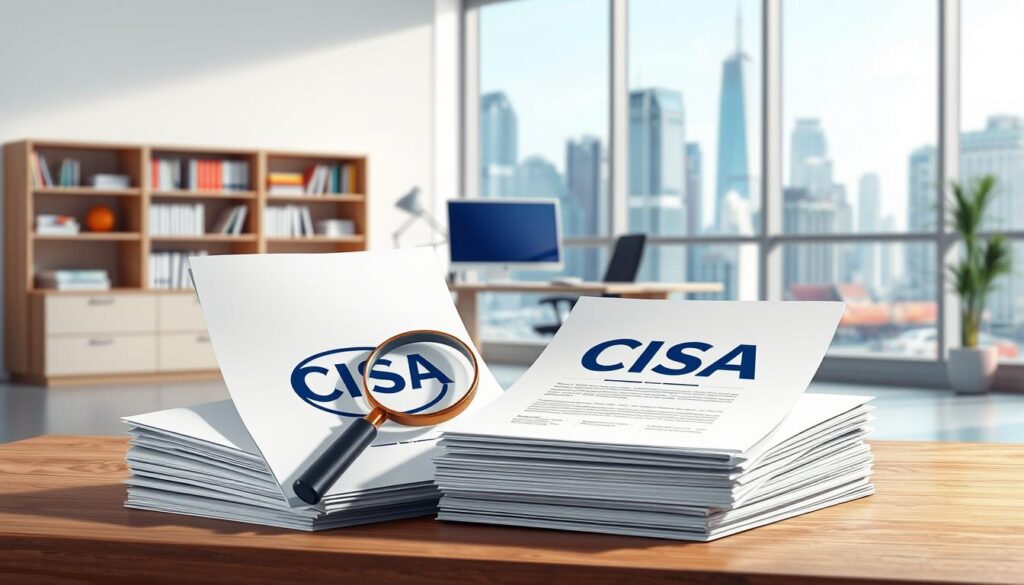Did you know that the demand for certified information systems auditors is skyrocketing, with the Bureau of Labor Statistics predicting a significant growth in the field? As technology advances, the importance of certification in IT audit and cybersecurity has become paramount.
Obtaining your CISA certification is a crucial step for professionals looking to advance their careers in this field. This comprehensive guide will walk you through the process of achieving this prestigious certification, following the official ISACA guidelines.
This guide is designed for both beginners and seasoned professionals aiming to enhance their expertise in information systems audit, control, and security.
Key Takeaways
- Understand the importance of CISA certification in today’s cybersecurity landscape.
- Learn the main steps involved in obtaining CISA certification.
- Discover the growing demand for certified information systems auditors.
- Explore career advancement opportunities with CISA certification.
- Follow a comprehensive guide tailored for both beginners and professionals.
What is CISA Certification and Why It Matters
As a globally recognized certification, CISA is highly valued in the IT industry for its rigorous standards and comprehensive coverage of information systems auditing. The CISA certification, which stands for Certified Information Systems Auditor, is administered by ISACA, a well-respected organization in the IT governance and security community.
Understanding the CISA Designation
The CISA designation represents a professional’s expertise in auditing, control, and security of information systems. It signifies that the individual has the skills, experience, and credibility to manage vulnerabilities, ensure compliance, and deliver value to enterprise-level IT systems. CISAs are recognized internationally as professionals who can leverage standards, offer solutions, and institute controls.
Benefits of Becoming CISA Certified
Becoming CISA certified offers numerous benefits, including career advancement opportunities, higher salary potential, and increased credibility in the field of information systems auditing and security. Employers view CISA certified professionals as valuable assets who can help organizations maintain compliance and security. The certification demonstrates a commitment to maintaining high standards in auditing and control of systems, validating a professional’s ability to identify vulnerabilities and ensure information systems security.
CISA Certification Requirements Overview

To become a CISA certified professional, you must meet specific requirements that validate your expertise in information systems auditing, control, and security. These requirements are designed to ensure that CISA holders possess the necessary knowledge, skills, and experience to excel in their roles.
Education Prerequisites
While there are no strict education prerequisites for CISA certification, having a relevant bachelor’s degree can be beneficial. In fact, a degree can substitute for some work experience requirements. For instance, 60 university semester credit hours are equivalent to one year of work experience. This flexibility allows candidates to leverage their academic achievements to meet some of the certification requirements.
Experience Requirements
A minimum of 5 years of professional experience in information systems auditing, control, or security is required for CISA certification. This experience must be gained within the 10-year period preceding the application date. It’s worth noting that candidates have 5 years from the date of passing the exam to apply for certification while meeting all other requirements.
Professional Ethics and Standards
Adhering to ISACA’s Code of Professional Ethics is a mandatory requirement for CISA certification. This code guides professional and personal conduct, ensuring that CISA holders maintain the highest standards of integrity and professionalism. Additionally, CISA holders must comply with the Information Systems Auditing Standards adopted by ISACA, further emphasizing the importance of ethical conduct and professional competence.
- CISA certification requires a combination of education, experience, and adherence to professional ethics.
- A relevant bachelor’s degree can substitute for some work experience requirements.
- 5 years of professional experience in information systems auditing, control, or security is mandatory.
- Candidates must adhere to ISACA’s Code of Professional Ethics and Information Systems Auditing Standards.
Step 1: Preparing for the CISA Exam
Your journey to CISA certification begins with a well-planned preparation strategy for the exam. The CISA exam is open to anyone interested in information security, and you can take it even if you haven’t met the experience requirements yet.
CISA Exam Structure and Content
The CISA exam covers five domains: Information Systems Auditing Process, Governance and Management of IT, Information Systems Acquisition, Development and Implementation, Information Systems Operations and Business Resilience, and Protection of Information Assets. It consists of 150 multiple-choice questions to be completed within four hours.
Study Resources and Preparation Tips
To prepare for the exam, you can utilize various study resources, including the ISACA CISA Review Manual, question databases, online courses, and study groups. Effective preparation tips include taking practice tests, focusing on weak areas, and understanding the application of concepts rather than mere memorization.
Creating Your Study Plan
Creating a personalized study plan based on your existing knowledge, available time, and learning style is crucial. Allocate sufficient time, typically 3-6 months, for thorough preparation, depending on your background and experience.
Key Takeaways:
- The CISA exam is flexible, allowing you to take it before fulfilling experience requirements.
- A well-structured study plan is essential for success.
- Utilize a variety of study resources to enhance your preparation.
Step 2: Taking and Passing the CISA Exam
Now that you’re prepared, let’s walk through the process of taking and passing the CISA exam. To start, you’ll need to register for the exam through the ISACA website.
Exam Registration Process
To register for the CISA exam, you’ll first need to create an ISACA account if you haven’t already. Once your account is set up, you can pay the exam fee and schedule your exam appointment. Keep in mind that exam appointments are only available 90 days in advance, so plan accordingly.
If your preferred exam date or site is not available, check back closer to your desired date, as new appointments are released periodically. Also, ensure your CISA exam eligibility hasn’t expired by checking your ISACA account under the Certification & CPE Management tab.
What to Expect on Exam Day
On the day of your exam, arrive early at the testing center with the required identification. The CISA exam is computer-based, and you’ll be given a set amount of time to complete it. Familiarize yourself with the testing environment to avoid any surprises.
Tips for success include managing your time effectively and using the marking feature for difficult questions. This will help you make the most of the time available and reduce stress.
Understanding Your Exam Results
After completing the exam, your results will be presented on a scaled scoring system ranging from 200 to 800, with 450 being the passing score. If you pass, you’ll have five years to apply for certification while meeting other requirements. If you don’t pass, you’ll need to retake the exam, so it’s essential to understand your results and plan accordingly.
Step 3: Meeting the Experience Requirements for Getting Your CISA Certification

Gaining the required professional experience is a vital step towards obtaining your CISA certification. To be eligible, you need to have a minimum of five years of professional experience in information systems auditing, control, or security work. This experience should be gained within the 10-year period preceding your application date for certification.
Qualifying Work Experience Areas
The work experience should align with the five CISA domains: Information Systems Auditing Process, Governance and Management of IT, Information Systems Acquisition, Development and Implementation, Information Systems Operations and Business Resilience, and Protection of Information Assets. Your experience can include tasks such as:
- Conducting audits and assessments of information systems
- Evaluating IT governance and management practices
- Participating in the development and implementation of information systems
- Ensuring business resilience and continuity
- Implementing security measures to protect information assets
You can also substitute some work experience with relevant education. For instance, 60 university semester credit hours can be considered equivalent to one year of work experience, up to a maximum of two years.
Experience Verification Process
It’s essential to document your work experience properly, describing your job duties and how they align with the CISA domains. Your experience will need to be verified by a supervisor or manager. To facilitate this process, ensure that your documentation is clear and comprehensive.
Candidates with diverse backgrounds can still qualify if they have transferable skills relevant to the CISA domains. It’s crucial to highlight these skills when documenting your experience. Remember, you have five years from the date you pass the exam to meet the experience requirements.
Step 4: Applying for CISA Certification
Having successfully passed the CISA exam, you can now proceed to apply for your CISA certification. This step involves a few key processes that you need to complete to become a certified CISA professional.
Application Fee and Process
To start your application, you’ll first need to pay a one-time US$50 application processing fee. This fee is paid through your MYISACA account, where you’ll also access the application form. It’s essential to note that you can only submit your application after your official exam scores have been released.
As part of the application process, you’ll need to provide documentation, including proof of passing the exam and verification of your work experience. Ensure that your work experience is verified by your supervisor or manager, as this is a critical component of your application.
Application Timeline and Verification
Candidates must apply for certification within five years of passing the exam. ISACA will verify the information submitted, and in some cases, may conduct an audit. It’s advisable to keep copies of all submitted documents and follow up if necessary to ensure a smooth process.
By understanding the application and verification timeline, you can plan accordingly and avoid any delays in receiving your CISA certification.
Maintaining Your CISA Certification
Your CISA certification is not a one-time achievement, but a continuous journey. To maintain your certified status, you need to fulfill specific requirements that ensure your knowledge and skills remain up-to-date in the field of IT auditing and control.
Continuing Professional Education (CPE) Requirements
One of the key requirements for maintaining your CISA certification is completing Continuing Professional Education (CPE) hours. You must attain and report a minimum of 120 CPE hours during a three-year reporting period, with a minimum of 20 CPE hours per year. Qualifying CPE activities include attending conferences, completing online courses, publishing articles, and participating in professional development workshops. You can track and report your CPE hours through the MYISACA portal.
Annual Maintenance Fees and Renewal Process
In addition to CPE requirements, you must also pay annual maintenance fees to keep your CISA certification active. The fees vary for ISACA members and non-members. It’s essential to meet the deadlines for fee payment and CPE reporting to avoid any lapse in your certification. If you hold multiple ISACA certifications, you can often count CPE hours earned for one certification toward others, making it more efficient to maintain multiple certifications simultaneously.
Career Opportunities for CISA Certified Professionals
As you achieve your CISA certification, you’ll unlock a wide range of career opportunities in the field of information systems auditing. With this prestigious certification and a relevant degree, you become qualified for various job titles that are crucial to the cybersecurity and information management needs of organizations.
Job Roles and Responsibilities
CISA certified professionals can explore numerous career paths across different industries and sectors. Some common job roles include Internal Auditor, IT Audit Manager, Information Security Analyst, IT Risk and Assurance Manager, Cybersecurity Professional, IT Consultant, and Chief Information Officer. As a certified information systems auditor, your day-to-day responsibilities may involve implementing risk management-based audit strategies, planning and executing audits, and providing recommendations to management based on audit results.
Key responsibilities of certified information systems auditors include:
- Implementing a risk management-based audit strategy for information systems.
- Planning audits to determine whether IT assets are protected, managed, and valuable.
- Executing audits in compliance with organizational standards and objectives.
- Sharing audit results and providing recommendations to management.
Salary Expectations and Job Outlook
CISA certified professionals can expect competitive salaries, ranging from $52,459 to $140,342 annually, depending on experience, location, and specific role. Internal audit directors with CISA certification are among the highest-paid professionals, earning an average annual salary of $136,082. The job market for CISA professionals is growing, with IT security auditors benefiting from an estimated 12% employment growth from 2018 to 2028.
The positive job outlook is further supported by the U.S. Bureau of Labor Statistics’ projection that computer and information technology occupations will add more than 500,000 positions by 2028. This growth underscores the value of CISA certification in enhancing career prospects and salary potential.
Conclusion: Your CISA Journey Begins Now
Embarking on the CISA certification journey can be a pivotal moment in your cybersecurity career. To achieve this prestigious credential, you’ll need to prepare for and pass the CISA exam, meet the experience requirements, apply for certification, and maintain your credential through ongoing professional development.
By becoming CISA certified, you’ll not only enhance your career prospects but also demonstrate your expertise in information systems auditing and security. With the demand for skilled cybersecurity professionals on the rise, now is the perfect time to start your journey.
